Hydraulic Clutch System for Improved Vehicle Performance and Smooth Engagement
Understanding Hydraulic Clutch Lines Essential Components of Automotive Clutch Systems
In modern automobiles, the clutch plays a critical role in the transfer of power from the engine to the wheels. The hydraulic clutch system, in particular, has gained popularity due to its efficiency and ease of use compared to traditional mechanical systems. At the heart of this system is the hydraulic clutch line, a vital component that ensures the smooth operation of the clutch mechanism. This article delves into the significance of hydraulic clutch lines, their functioning, and essential maintenance tips.
What is a Hydraulic Clutch Line?
A hydraulic clutch line is a flexible tube typically made of high-strength rubber or reinforced plastic that connects the clutch master cylinder to the clutch slave cylinder. This line serves to transfer hydraulic fluid, which operates the clutch mechanism. In hydraulic systems, force applied to the master cylinder generates pressure in the hydraulic fluid, which then engages or disengages the clutch via the slave cylinder.
The hydraulic clutch system offers a compelling advantage over its mechanical counterparts, particularly in terms of smoother operation and reduced driver effort. The elimination of a direct mechanical linkage minimizes wear and tear, leading to a longer lifespan and improved reliability.
How Hydraulic Clutch Lines Work
When the driver presses the clutch pedal, the master cylinder converts the mechanical force into hydraulic pressure. This pressure travels through the hydraulic clutch line to the slave cylinder, where it activates a lever or fork that disengages the clutch. This process allows for seamless gear shifts, enhancing the overall driving experience.
During operation, the hydraulic fluid remains contained within a closed system. The quality and integrity of the hydraulic clutch line are critical for maintaining proper pressure. Any leaks or damages can result in insufficient pressure, making it difficult to engage or disengage the clutch, leading to potential vehicle operational issues.
Benefits of Hydraulic Clutch Lines
1. Improved Performance Hydraulic clutch systems provide smoother engagement and disengagement, enhancing the driveability of the vehicle. Drivers can expect a more responsive feel compared to older mechanical systems.
2. Reduced Maintenance Since hydraulic systems have fewer moving parts that can wear out compared to mechanical systems, they generally require less maintenance over time.
hydraulic clutch line

3. Compact Design The hydraulic clutch line allows for the design of more compact engine bays, as it does not require bulky linkages or mechanical components.
4. Enhanced Reliability Hydraulics can be less prone to issues like cable stretch or binding, leading to improved reliability in the long run.
Maintenance of Hydraulic Clutch Lines
While hydraulic clutch lines are relatively low-maintenance, periodic inspections are crucial for ensuring their longevity and reliability. Here are some tips for maintaining hydraulic clutch lines
1. Regular Inspections Routinely check the hydraulic clutch line for signs of wear, cracks, or leaks. Any visible damage should be addressed immediately.
2. Fluid Changes The hydraulic fluid can degrade over time, leading to performance issues. Follow the manufacturer's recommendations for fluid replacement intervals to maintain optimal performance.
3. Bleed the System Air can enter the hydraulic system, leading to a spongy clutch feel. Periodically bleeding the hydraulic system can help remove trapped air and ensure a firm pedal feel.
4. Monitor Pedal Feel Pay attention to any changes in clutch pedal feel. If the pedal feels unusually soft or engages at an odd point, it could indicate a problem with the hydraulic system that needs further investigation.
Conclusion
Hydraulic clutch lines are a critical component of modern automotive clutch systems, providing numerous benefits over traditional mechanical systems. From improved performance and reliability to reduced maintenance needs, understanding and caring for these lines is essential for any vehicle owner. By ensuring the integrity of the hydraulic system, drivers can enjoy a smoother and more responsive driving experience for years to come.
-
Workings of Clutch Pipe and Hose SystemsNewsJun.04,2025
-
The Inner Workings of Hand Brake Cable SystemsNewsJun.04,2025
-
The Secrets of Throttle and Accelerator CablesNewsJun.04,2025
-
The Hidden Lifeline of Your Transmission Gear Shift CablesNewsJun.04,2025
-
Demystifying Gear Cables and Shift LinkagesNewsJun.04,2025
-
Decoding Clutch Line Systems A Comprehensive GuideNewsJun.04,2025
